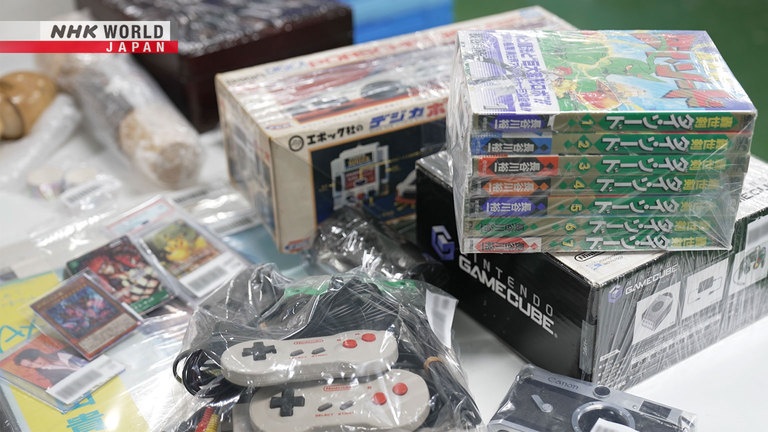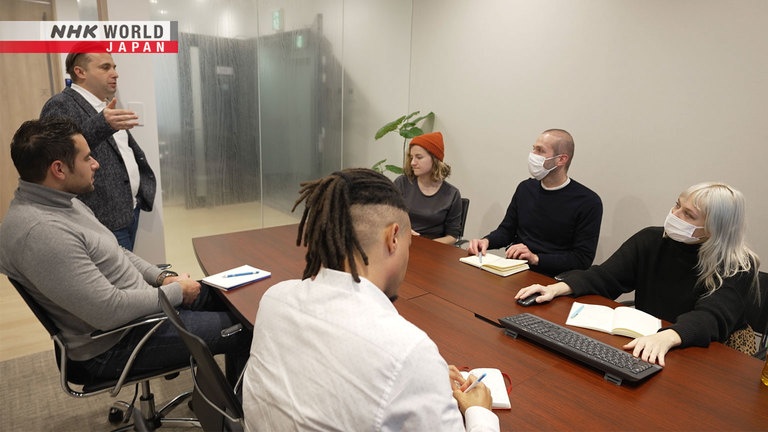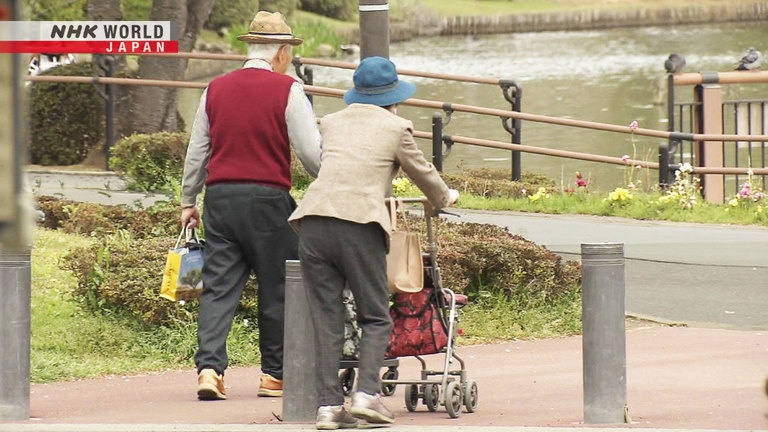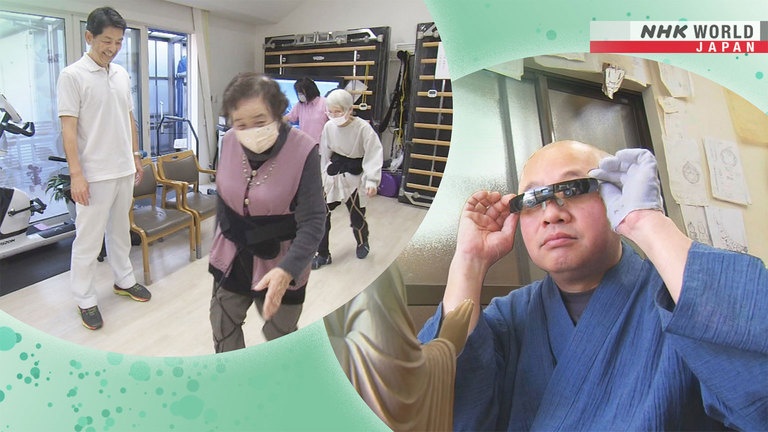Choosing Japan as a Business Home - Viacheslav Surovyi
[On-Site Report: Choosing Japan as a Business Home - Viacheslav Surovyi]
A Ukrainian entrepreneur has created an online proxy-shopping service that allows foreign shoppers simple and affordable access to a variety of products from Japan.
*Subtitles and transcripts are available for video segments when viewed on our website.
On-Site Report: Choosing Japan as a Business Home - Viacheslav Surovyi

The company's proxy-shopping service gives people outside of Japan access to a broad range of shopping options ranging from new products to retro games and vintage collectibles.

Focused on reaching shoppers around the world, more than 60% of the main office's staff hail from countries outside of Japan.
Global Trends: "Age Tech" Takes Bold Strides for Better Lives
Most of us will have to cope with getting old eventually. But it doesn't have to be as unpleasant as we may imagine. A range of devices and innovations, known as "age tech," is making it easier for people to carry on comfortably into their later years.

Japan has a greater proportion of elderly people than any other country. "Age tech," which uses technology to help cope with physical decline, is emerging as a major business.

The eyesight and mobility of many people deteriorate as they age. Eyewear with automatic focus adjustment and rubber walking support equipment can ease the inconvenience.
In Focus: Japan Investment Program Spurs Yen Exodus
Many Japanese people are taking advantage of a tax-free program to turn their savings into investments. But that's putting pressure on the country's currency, the yen. We look at how the investment incentive program is having consequences that many people did not expect.
Transcript
This mother living in Tokyo says she is thinking of investing more under the program.
"I want my children to be able to do what they want when they grow up."
"Now with a second child, we are considering putting more into investments."
Japan launched a program in 2014 called NISA to support small investments.
It stands for Nippon Individual Savings Account.
It was expanded this year, and now allows people to hold a total balance of up to 18 million yen, about 120 thousand dollars.
The returns on that are tax-free indefinitely.
Behind the move is the government's desire to boost household wealth,
as well as national economic growth by freeing up the vast savings sitting in banks.
More than half of Japan's household financial assets are held in cash and deposits.
That is a huge contrast with the United States, where only a little over 10 percent are.
But with the new NISA, there's been a rush to put money into investment funds, at the fastest pace in 16 years.
The government has been boasting about how well things are going.
"In the past 10 years, more than one in five adults has used NISA."
"NISA has been accepted by the public as one of the tools for the stable accumulation of assets."
But the money really isn't flowing into Japanese stocks.
Rather, data show the most popular investment vehicles last month were mutual funds tracking US and other global stocks.
Products that favored Japanese shares were far less desirable.
This comes as Japanese stocks are enjoying a rally that has lifted the major index to near its all-time-high.
The buying-spree is being driven in fact by foreign investors who are purchasing at a level not seen in 7 years.
So why aren't Japanese getting into stocks in their own country?
"If you were to invest now, what would you invest in?"
"I think I would invest in overseas stocks."
"Why is that?"
"I can't expect much growth in the Japanese economy, or in Japanese stocks."
So Japanese people aren't showing a lot of confidence in the domestic market.
Experts say that's because expectations are low after decades of slow growth
as well as challenges such as the declining population and a lack of competitiveness.
Others point out that the money flowing out through the NISA program has other consequences.
"I estimate between 45 and 65 billion dollars is going out annually."
"There's been a wave of foreign visitors to Japan, and their spending far exceeds that by Japanese overseas."
"The surplus hit a record 22 billion dollars last year."
"But that may be easily offset by the money going out through the investment program."
"So on whether overseas investing is causing a weaker yen, I would have to say yes."
The tax incentive program does appear to be encouraging people to shift cash into investments.
But the question remains of how to restore confidence among Japanese people
to get the money flowing toward Japanese enterprises.
This is a science museum in Tokyo.
Last November, a permanent exhibition opened to help people experience the effects of aging.
In this section, visitors get a feel for the inability to walk quickly due to muscle loss.
"Even if I try to walk, my body doesn't move forward."
Technologies related to the problems of aging are on display.
This device uses a camera to recognize written words that are read aloud by an automated voice.
"Old age is something that almost everyone will experience."
"So instead of taking it negatively, let's have a positive approach and make the most of science and technology to live with style."
Miura Yozan makes and repairs Buddhist figures in Kyoto.
With age, this kind of detailed work has become much more of a burden.
So he started using a product released just this year, known as "autofocus eyewear."
"For craftsmen like ourselves, the eyes are the most important thing."
"I found it annoying and stressful to repeatedly take my glasses on and off. That has been greatly reduced."
The product was developed by a start-up that makes eyewear for people who are visually impaired.
Normally, the lens of the eye becomes thicker when focusing on something close-up.
But as people age, the lens cannot adjust, leading to far-sightedness.
This eyewear uses sensors to measure the distance to an object.
A special lens powered by an electrical charge automatically adjusts to bring items into focus.
"Seniors give up doing detailed work because of their age."
"With a little help, they can carry on with joy in the era of lifetimes lasting 100 years."
Some innovations, on the other hand, are based on more familiar ideas.
Watanabe Yoko is 75 years old.
She started feeling pain in her right foot last year due to illness.
For rehabilitation, her doctor recommended a product made of rubber that helps the leg muscles used in walking.
"It's much easier for me to step forward."
The product was developed by Yamada Yoshihiro, who runs a physical treatment center.
He realized that for people with foot injuries or weak muscles,
what was needed was an inexpensive device that many people could use.
"It makes your foot feel lighter, so it makes you feel like you want to walk more, go outside more, which is important."
"If it makes you feel confident, I think you can challenge yourself to try other things too."
Japan is at the forefront of technology to help people as they age, because it needs to be.
From simple gadgets to complex machines, this could just be the beginning for an industry where demand will keep on rising.
Businessman Viacheslav Surovyi hails from Ukraine.
In just 10 years, his Osaka-based company has seen its annual sales increase to over $80 million per year.
With a diverse staff, his company now ships products from Japan to 175 countries and regions around the world.
Today's On-Site Report will show you an entrepreneur who spotted opportunity in Japan,
and the challenges he has had to overcome while growing his business.
This is ZenMarket's Osaka-based warehouse.
From anime figures and trading cards, to domestic car parts and even imported albums,
almost every type of product you can imagine can be found here.
The company provides a simple and affordable online proxy shopping service
that allows people from overseas to purchase new and used items from Japanese retailers and auction sites
that they would usually have difficulty accessing.
The company was founded by Ukranian entrepreneur, Viacheslav Surovyi,
who first came to Japan as a university student in 2003.
Your relatives, your friends would ask you sometimes to bring something from Japan either it's kind of sweets or some digital.
Back then it was about digital cameras.
Viacheslav co-founded ZenMarket with three other international students in 2014.
The company has partnered with several of Japan's largest online retailers and auctions sites.
On the user side, the company's portal site not only offers a simple and consolidated shopping experience,
it also offers customized translation into 19 different languages with the click of a button.
When a user places an order, ZenMarket handles the purchase and payment on their behalf.
Once the products are received at its warehouse in Japan, they undergo a quality check,
and are then repackaged and shipped according to the specific regulations of each destination country.
In addition to the international shipping costs, ZenMarket charges a service fee of about $3.50 per item.
When Viacheslav started his business, he didn't expect second-hand Japanese goods to be so popular.
However, pre-owned items now make up nearly 70% the purchases customers make through his service.
For example, like you can find some retro gaming stuff.
You can also find some old cameras that people obviously collect.
The unique combination of foreign and Japanese goods available here is difficult to find elsewhere.
The rarity and good condition of these items make them extremely appealing to foreign shoppers.
Well, if you come to think about like purchasing power in the 60s, 70s, 80s,
not too many countries that people could afford to buy these stuff a lot and Japan was one of them.
The company's foreign staff make sure the products they offer reach a broad international customer base.
I'm an American, born and raised in New York City.
I have actually more experience working in Japan than I do in the States.
"I'm from Portugal."
I work in marketing, I try to help Japanese companies to sell outside of Japan.
"I'm Italian."
I can speak Italian, English, Japanese, and a little bit of Spanish.
From handling 40,000 monthly customer inquiries to marketing and web design,
the company's foreign staff handle a broad range of responsibilities.
We decided to go for markets that our competitors didn't do.
We saw that there's still a lot of countries, a lot of customers who cannot properly speak English language
or they would be more comfortable using our service in their own language.
The company now boasts over 2 million registered users and in Fiscal Year 2022, it saw sales reach $80 million.
Viacheslav completed a doctoral course in Translation Studies at the University of Tokyo,
and is able to speak, read, and write in Japanese.
However, when he first arrived in Japan, he found even buying a snack at a convenience store could be a challenge.
It turned out that when I went home it wasn't normal bread.
It was bread with this sweet beans inside.
It was an unfamiliar weird flavor and taste for me but I had a lot of those so I have to eat the whole pack.
Viacheslav says that being able to communicate in Japanese allowed him to start his own company here,
and is likely one of the main reasons why he is still in business to this day.
That's why his company holds weekly Japanese classes for employees.
This not only ensures an easier transition to life in Japan,
but also helps foreign staff to communicate with Japanese colleagues as well as each other.
When we visited, the class was practicing using a new vocabulary word.
"Exchange (rate)."
"The exchange rate for the yen is low now."
One of the staff members taking today's class is Emmanuel Picaut.
After studying marketing in university, he left France and came to Japan on a working holiday.
Wanting to get back on his original career path, he joined ZenMarket in July of 2020.
So I did English teaching for four to five years,
and I decided, I wanted to get back to my field of studies which is marketing.
It's exactly what I studied to do as a job, so it's very fulfilling.
Viacheslav says that one of the biggest surprises he has encountered since starting his business in Japan,
is the extremely high value Japanese businesses place on trust.
This led to him being turned down many times when initially reaching out to potential partners.
We thought that this part would be easy because we said,
"hey, we'll just sell your items, sell your products and it's good for you, right?"
And still, a lot of them said, "I would rather not, I will wait."
This part was also kind of a bit unexpected.
Just comparing to my home country, it feels like,
especially like when country economy is evolving and people sometimes go for high risk, high return strategies
while in Japan, they kind of go with low risk, low return.
Consequently, he found Japanese companies to be much slower than he was used to when it came to making business decisions.
This speed of making business decisions was unexpected.
Well still, for Japan to be more competitive on a job market, or like in general, on a cross border EC Market,
I feel like this could slightly change.
But the more I live in Japan, the more I understand the psychology.